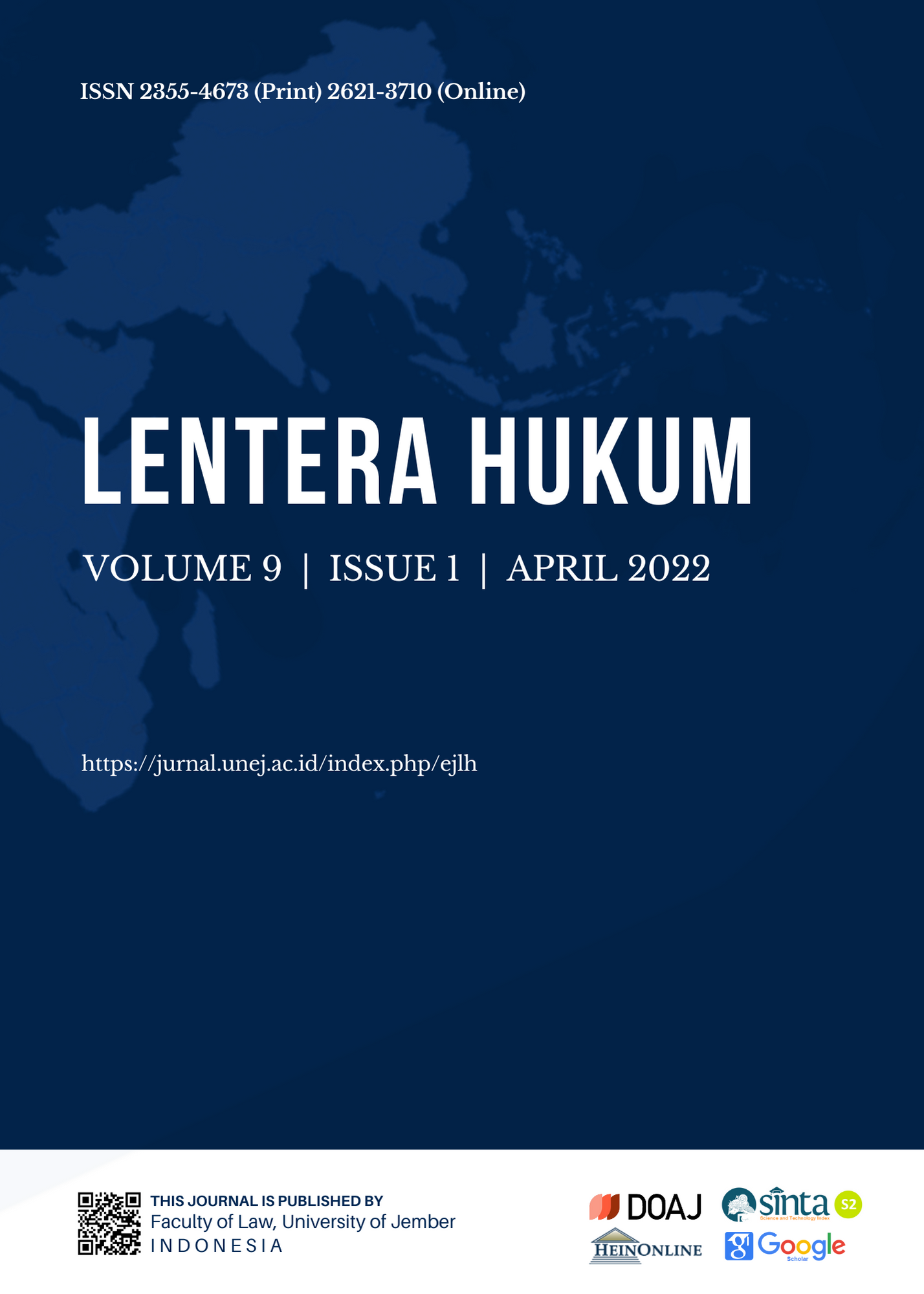Recognition of Forest Carbon Rights in Indonesia
A Constitutional Approach
DOI:
https://doi.org/10.19184/ejlh.v9i1.29331Abstract
As a forest-rich nation, Indonesia has actively participated in carbon market governance like the REDD+ program. With the rapid expansion of REDD+ to address the effects of climate change, questions surrounding carbon rights have surfaced. This study aims to analyze the regulatory development of carbon rights in Indonesia and its impact on the community rights over forest resources by elaborating on the ideal carbon rights governance under a constitutional perspective. The study uses the normative method, which includes pertinent rules and supporting statements from climate change specialists. This study shows that carbon rights are defined broadly as the right to participate in forest carbon trading, although they require a government permit. There is no clear explanation of the relationship between land tenure and carbon ownership under the existing legislation, despite four permits to acquire carbon benefits: environmental service, social forestry, ecosystem restoration, and forest carbon administration permit. While the state can claim state control rights on certain commodities like carbon under Article 33 of the Indonesian Constitution, it also has to manage the distribution of carbon incentives based on the public interest. By facilitating the transfer of carbon rights under a carbon trading scheme while highlighting the government's role in sharing the benefits of carbon via a result-based payment scheme, Presidential Regulation 98/2021 contributes to more explicit control of carbon rights. All concerns related to carbon rights governance in Indonesia include complicated administrative and technical requirements for applying for a license, insecure land tenure due to overlapping claims, and unlawful encroachment in forest regions. Since land tenure issues remain unresolved, recognizing carbon rights as an alternative to recognizing marginal and community rights to forest resources could be viable.
KEYWORDS: Environmental Regulation, Forest Carbon Rights, REDD+.
Downloads
References
Agrawal, Arun & Arild Angelsen, “Using Community Forest management to achieve REDD+ goals†in Realizing REDD+: National strategy and policy options (Bogor: CIFOR, 2009).
Alain Karsenty, Aurelie Vogel, & Frederic Castell, “Carbon Rights, REDD+ and payments for environmental services†(2014) 35 Environmental Science and Policy.
Anderson, Patrick, Free, Prior and Informed Consent in REDD+: Principles and Approaches for Policy and Project Development (Asia: RECOFTC & GIZ, 2011).
Andiko, Studi Perbandingan Proses Pengakuan Hak dan Perizinan Pengelolaan dan Pemanfaatan Hutan serta Kawasan Hutan untuk Masyarakat dan Perusahaan (Batam: ASM Law Office, 2017).
Ardianto Budi Rahmawan & Kenny Cetera, “Kajian Teori Public Trust Doctrine pada Kasus Lingkungan: Studi Kasus UU Minerba Baruâ€â€ (2020) 7:1 Jurnal Hukum Lingkungan Indonesia 28–47.
Arjuna Dibley & Martin Wilder A M, “Forest Carbon Rights: Lessons Learned from Australia and New Zealand†(2016) 3 Climate Change Law Review 202–214.
Dicky Edwin Hindarto, Andi Samyanugraha, & Debi Nathalia, Pengantar Pasar Karbon untuk Perubahan Iklim (Jakarta: PMR Indonesia, 2018).
Feby Ivalerina, Konsep hak-hak atas Karbon (Epistema Institute, 2010).
Fitria Nurhayati, “Review Izin Sawit Lindungi Hutan tanah Papuaâ€, (2021), online: <https://katadata.co.id/jeany/infografik/6170e3784228c/review-izin-sawit-lindungi-hutan-tanah-papua>.
Frances Seymour & Jonah Busch, Why Forest Why Now? The Science, Economics, and Politics of Tropical Forests and Climate Change (Washington DC: Center for Global Development, 2016).
Hasbullah, F Husni, “Azas Pemisahan Horizontal (Horizontae Scheiding) Dalam Hukum Tanah di Indonesia dan Permasalahannya†(1992) 22 Jurnal Hukum Pembangunan 77–87.
Jeany Hatriani & Fitria Nurhayati, “Tumpang Tindih Lahan Sawit di Kawasan Hutan sebesar 3,4 juta Hektarâ€, (2019), online:<https://databoks.katadata.co.id/datapublish/2019/12/21/tumpang-tindihlahan-sawit-di-kawasan-hutan-sebesar-34-juta-hektar>.
Komara, Eko et al, “Kajian Mekanisme Benefit Sharing FCPF Carbon Fund untuk Pendanaan Desa Hijau di Kalimantan Timur†(2017) WWF Indonesia.
Kuntana Magnar, Inna Junaenah, & Giri Ahmad Taufik, “Tafsir MK atas Pasal 33 UUD 1945: (Studi atas Putusan MK Mengenai Judicial Review UU No. 7/ 2004, UU No. 22/ 2001 dan UU No. 20/2002)â€
(2010) 7:1 Jurnal Konstitusi.
Larson, Anne M, et al., "Land Tenure and REDD+: The good, the bad
and the ugly" (2013) 23:3 Global Environmental Change 678–689.
Lasse Loft et al., "Taking Stock of Carbon Rights in REDD+ Candidate
Countries: Concept Meets Reality" (2015) 6:4 Forests 1031–1060.
Luca Tacconi & Muhammad Zahrul Muttaqin, “Reducing emissions from
land use change in Indonesia: An Overview†(2019) 108:101979
Forest Policy and Economics.
Maria SW Sumardjono, Kajian Harmonisasi Undang-Undang di bidang
Sumber Daya Alam dan Lingkungan Hidup (SDA-LH (Jakarta: KPK,
2018).
Nirarta Samadhi, “Satu Peta Meniadakan Tumpang Tindihâ€, World
Resources Institute, online: <https://wri-indonesia.org/id/blog/satupeta-meniadakan-tumpang-tindih>.
Pham Thu Tuy et al., Approaches to Benefit Sharing: A preliminary
comparative analysis of 13 REDD+ countries (Bogor: CIFOR, 2013).



